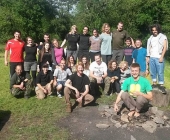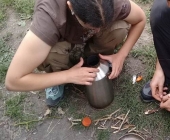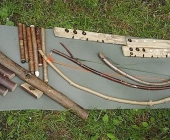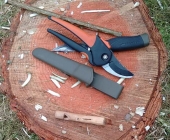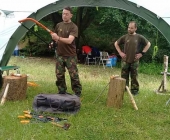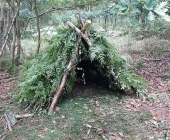Here we go. My journey started. After thinking about it over and over. One night an unexpected mail came, igniting a wish to fly away and live new experiences again. Submitted my application and then the waiting … almost forgot about it. I’ll go, another time, never mind, now anyway is not the right time… was saying to myself. But why should we postpone things? Well, that’s another story! Later on I got the mail from the organization Povod ‘You’re in’ and I ended up here:
The local transfer company forgot to pick me up, but we solved that quickly and had a laugh. Afterwards, just before taking off I became all nervous as it was clear we were having a delay. Thereon the crowded airport and waiting for my luggage pick up about 20 minutes. Something turned against me that day, but OK, instead of listening to my gut that 50 minutes is not enough to catch the next transport I just relied on general luck in ideal circumstances – mistake! Always have one hour, an hour and a half reserved for this. Anyway, I took the bus, which was cheaper, but not as comfortable.
At 0:30 I arrived in Birmingham (UK). With a very warm welcome from the organizer I was happy to have finally arrived to the European training course in the frame of Erasmus+ programme. Ate a piece of cold pizza, had a shower and went to sleep. Coming as last, I missed a great evening of live music in the nearby pub, I was told. We were accommodated in a pretty cool hostel named Hatters, a former factory. Rooms were quite fine, each had its own bathroom! Only the English faucets were a bit annoying, if you’re familiar with them 😉
So, one of the main objectives of the international training course named Bushcraft DNA – Developing Non-formal Education Activities in Nature was bringing together youth workers from different countries to teach us how using and developing non-formal education methods in nature can be an even more effective tool to transfer knowledge. Activities were carried through creative workshops in pairs or groups and by having presentations and reflection time with evaluation. We were having discussions about which way to transfer knowledge at best, how to establish an organization that takes care about organizing activities in nature (»forest school«) and how to sustainingly carry out activities in nature.
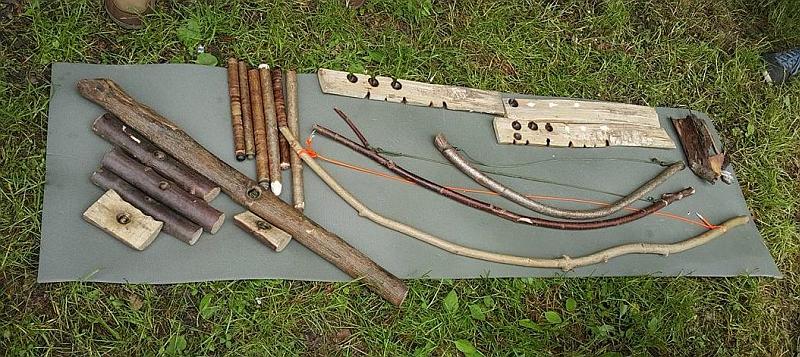
Part of the first day was dedicated to know each other through some games and questions as it’s not easy to remember names and functions of 25 participants coming from Portugal, Romania, Spain, Italy, United Kingdom, Bulgaria, Macedonia, Greece, Croatia, Poland, Slovakia, Czech Republic, Estonia, Latvia and Slovenia (me). Activities partially took place in the city park, where we were left for the last 15 minutes to connect with »nature« and ourselves and to write down our feelings that we later presented to the whole group. Afterwards we also introduced ourselves again through questions we were answering each other in the park. Of course we had an introduction on how the project will proceed, what to expect from the project and what they expect from us. We ended the day with the international dinner, combining together typical foods from our countries.
Finally, the hardly expected day came. Time for transferring to Wyre forest, near Bewdley! The place was amazing. In front of the cottage two imposing southern beeches and a stream very close to them. Perfect. The first day already I felt some affinity to trees but those two impressed me even more. Some were accommodated in the cottage, some in tents. Each of us signed for turns to help preparing meals and washing the dishes. Cooking was not in our domain of course . Lots of us were missing some warm or liquid meals at some times, but being in a foreign country you have to adapt to their culture. I loved the snacks we had twice a day, having a bit of everything, especially fruit.
Before coming to the forest and also before starting the activities there, the Step out staff explained safety and security issues which are very important and the legislation about it is especially strict in the UK. Of course they wanted to give us a sense of how important this is when working with others and the responsibility that comes with it. Then, practice came into reality. We went deeper into the forest to build a natural shelter. Divided in two working groups, we each had to find two birches in the shape of Y. Having those together, a stake was put crosswise to form a triangle. We added some minor sticks on the sides and the structure was complete. By first weaving birch branches and then putting some bracken on top, the shelter was finished. So cool! The nice evening passed by playing games and singing by the guitar sounds in the tent.
The second day we were divided in three random groups and started with fire lighting workshops. We used Swedish fire-steel, fluffy pieces of cotton and three different thickness of branches in the first one. Then followed the technique with natural materials using a bow drill, which was surely more challenging and even funnier . The second workshop comprised getting to know edible and toxic plants from the surroundings (elder, nettle, plantain, wild garlic etc.). Furthermore, we learned to use an inox liquid container to heat liquids by lighting fire underneath it where fire lighting skills came in handy . We also prepared tasty elder flower pancakes on open fire and elder flower syrup. Yummy! At last we got to know essential tools and how to handle it safely. We made some fire-sticks and crafted a spoon or fork. In the evening we built some new natural shelters for some to sleep in it, while for the simpler shelters we used tarp. Again, the evening ended by sitting around the new fire camp, singing and playing the guitar and debates about this and that. Some went for a night walk in the forest as there is no dangerous animal out there. There was some light shower in the night, nothing to worry about.
Day three. Learning how to make nettle strings for bow drilling. This healthy and versatile plant can be rubbed from roots up to top without getting yourself stinged. Splitting the nettle stalk and removing the soft part you obtain a fine string to let dry and use for making the bow. This time we made some bracelets out of it. In the second workshop we individually caught some small land and water animals and put them together for observing, we chose one and described it to others to guess which it is. This way we did not only identify the animal and forgot about it, but tried to learn as much as we could about it. The workshop ended by miming our favourite animal and for others to figure out what animal is. In conclusion, we made a wood whistle. Was a bit challenging too, but everybody managed and we were all happy . We spiced up our evening by doing some impro theater, playing card games, playing a party game called mafia around the campfire and at last joined some of the people hanging at a place one named Symba’s rock, because it looked like the rock from Lion king . Two of the participants even slept under the rock. We really enjoyed spending time without phone signal, like years ago, before all this technology flooded.
We woke up to a rainy day, the sky was crying for us leaving, we said. In fact, we had some pretty lucky weather during our stay in the forest. After evaluating the weekend and group work we took our things, tidied up the place and left for the city. Lunches is the city were free as we got 4 GBP per day for lunch and could spend them as we wished (intoned for sandwiches). This afternoon was mostly free as organizers were reimbursing us for our travel costs one by one. Finally I had two hours and could visit the Jewelry quarter, a jewelry school exhibition and had a quick view of the famous library rooftop, architectural pride of Birmingham. So far I only had a quick evening stroll in the nicest part of the city. This evening our taste buds were pampered in an Asian all you can eat, followed by a pleasant walk and tea in the city with few participants. After we found a quite place and went meditating. Such a lovely night, too.
The last day was dedicated to learning about the structure and possibilities offered by the Erasmus+ programme in a very creative way, then networking, dissemination of the project and working in interest groups, where we set foundations for future projects about extreme sports, nature and hiking, personal development and art. The projects were very well prepared and interesting. The organizers, Consilium Development and Training kindly offered us support and the will to collaborate in carrying the projects out in the future. Dinner took place in a typical English pub. Simply tasty! But soon time to say goodbye came and we gathered in the hostels’ place for our last ‘altogether laughs’. It’s always sad when you have to say goodbye to people you spent a whole great week with! Some arrived earlier and/or stayed a bit longer having the option of staying up to maximum two additional days and getting travel cost reimbursement to a certain quote depending your county of origin.
To conclude I can say that the training course was carried out efficiently. The organizers showed proficiency, capability of organizing and creativity in carrying out activities, as well as for Step out, the ‘field team’ with their kindness and sense of humour, always ready to answer all our questions. I’m so thankful for this experience being a confirmation of me functioning much better outdoor and how much being connected with nature really means to me! Three days without signal was a real balm for our souls. I believe the experience will have a wider impact as most of the participants are youth workers or volunteers as well as the personal impact one had. After few days some already reported about some post activities carried.
I wish and hope for others to take advantage of such opportunities if only they can, being a fulfilling experience for gaining additional skills through non-formal learning, traveling with little costs or cost-free, knowing new cultures and people, widening your horizons etc. To me it’s just fantastic!
More information about the wide possibilities offered by the Erasmus+ can be found on https://ec.europa.eu/programmes/erasmus-plus/node_en. You can surely find something suitable for you, no matter your age. Don’t hesitate and contact your (local) cultural/educational/youth/non-profit organization that can take you to an unforgettable experience. Thanks to the EU for giving part of collected taxes for such activities and the possibility for spending an awesome week in nature this June, with some wonderful people.
P.S.: After Brexit (hoping it’s somehow temporarily 😛 ) the UK will not get Erasmus+ funding in the future.
